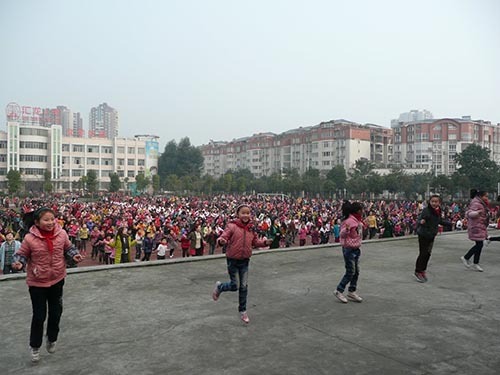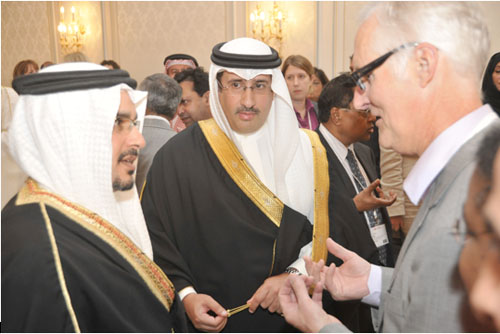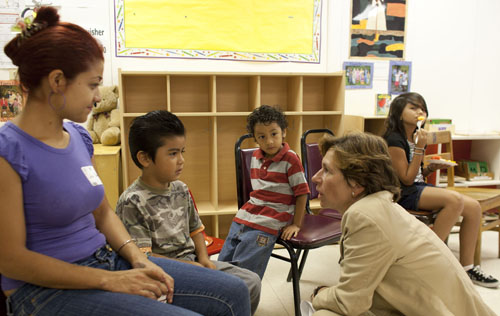
Last Thursday, I attended a dazzling gala to watch special education teacher Matthew Cunningham accept the inaugural GEMS Education Chicago Teacher Award. And yesterday, I listened as Andreas Schleicher presented the key findings from the 2013 OCSE insegnamento e l'apprendimento Indagine Internazionale (TALE).
In the context of Education Fast Forward (EFF) Debate 10, “Better Teaching for Better Learning: Results of the OECD Teaching and Learning International Survey (TALE),” which followed, Lord David Puttnam reminded us all that change is painful. As a young aspiring tennis player with a forehand that needed re-invention, he had learned that lesson the hard way during the 1st round of Junior Wimbledon when it was too late for change.
Change in education has historically taken time, but in an age of innovation when technology is impacting every aspect of our daily lives at a tremendous pace, it is vital to understand the day to day issues faced by teachers globally and move rapidly from a policy standpoint to bring about the changes they need to improve student outcomes.
I asked Michael Fullan, Lord Jim Knight and Pasi Sahlberg to share their perspectives after the Education Fast Forward (EFF) Debate 10.
Uomini, did the TALIS study ask all the right questions?
Pasi Sahlberg: I think overall, TALIS provides important and interesting comparable insights into the teaching profession around the world. Did TALIS ask ALL the right questions? I think this is a question that probably will divide opinions. My own burning question that TALIS doesn’t shed light on is how the rapidly growing Teach for All movement is affecting teachers and their work, especially in countries that are seeing many of their new teachers coming from these fast-track teacher prep programs. Another theme that remains quite silent in this survey is how significant leadership is in making schools work well. TALIS focused primarily on teachers and much less so on school leaders.
Michael completa: The TALIS study is valuable to generate a strong debate on the current status of teaching. It fell short because it generated what I call ‘Dangerous Half Truths’ – findings that have some merit but are deficient because they can be easily misinterpreted and result in superficial or harmful policies. Per esempio, the finding that teacher appraisal/feedback can lead to positive change in classroom practice fails to specify under what conditions this would be true (true if there is a collaborative and growth oriented culture; false if there is a punitive carrot and stick culture). The same problem affects the other big factor examined, Professional Development, which again only is effective when it contains strong pedagogical content and is integrated into the school improvement plans of school leaders and teachers working together.
Lord Jim Knight: Ampiamente parlando, sì, the study did ask all the right questions. It is always possible to quibble but it remains very insightful for secondary schools. I would have loved to see elementary school data to make a comparison.
What was the most important take home for you?
Pasi Sahlberg: I think the most interesting take-away for me is teachers’ views of the way society values the teaching profession and how wide the gap is between the countries where teachers feel they are valued and where they feel they are not. It is alarming to me that in France, Sweden and Spain, less than one of ten teachers feels valued. This suggests that it is not just more professional development or more pay that will change this dangerous trend, but more fundamental change in the role of how teachers are treated is needed.
Michael completa: The most important take away was the consistency of findings throughout the report that showed that teacher efficacy and job satisfaction were strongest when teachers work together, and principals work as instructional leaders helping teachers work in collaborative focused ways on the student learning agenda. Sfortunatamente, these findings tend to be underplayed because of the focus on appraisal and professional development. Not enough was made of the more powerful conclusion that improvement happens more deeply and more quickly when school leaders and teachers work together in focused ways on improving learning and achievement.
Lord Jim Knight: The most important take away is the importance of collaboration and feedback to drive development.
What are the key things we need to do to improve the teaching profession?
Pasi Sahlberg: If teachers are to engage in professional development, collaborative school improvement and pedagogical reflection in their work, as TALIS shows successful education systems do, changes in teachers’ working conditions must take place. In alcuni paesi, insegnanti’ work loads before professional development and collaboration in school are so big that, nella maggior parte dei casi, they don’t have time and energy to do anything else. One thing that should improve is better teacher policies in national education strategies. This includes as much how teachers are prepared as how they should be helped and supported in their work. We should stop thinking that teaching is easy and therefore anyone can be a teacher. Instead we should think that teaching is not rocket science, it much more complicated than that.
Michael completa: We need to stop counting so heavily on teacher appraisal based on carrots and sticks, and instead build the profession through i) focused intra-school collaboration; ii) focused inter-school learning; iii) standards for students, insegnanti e dirigenti scolastici che sono guidati dallo sviluppo; IV) trasparenza delle pratiche e dei risultati; e v) generalmente coinvolgendo la professione nello sviluppo di soluzioni che interessano tutti gli insegnanti. Il rapporto TALIS ha aggirato il dilemma chiave del passaggio dalla responsabilità negativa alla responsabilità guidata dal gruppo in relazione ai requisiti esterni.
Lord Jim Knight: Dobbiamo incentivare gli insegnanti in modo che utilizzino la collaborazione in modo creativo rispetto a un modo obbligato. Gli insegnanti dovrebbero avere diritto a più tempo per lo sviluppo professionale.
Maggiori informazioni sul dibattito sull'EFF 10 compresa la presentazione di Andreas Schleicher.
Michael Fullan è autore di molti libri sull'educazione e coautore di Capitale professionale: Trasformare l'insegnamento in ogni scuola. Lord Jim Knight è amministratore delegato di TSL Education, la più grande rete di insegnanti del mondo. Pasi Sahlberg è l'autore di Lezioni finlandesi: Cosa può fare il mondo Impara da Change Formazione in Finlandia?


Photo of sky scene is courtesy of GEMS Education
Nel Global Search per l'Educazione, unirsi a me e leader di pensiero di fama mondiale tra cui Sir Michael Barber (Regno Unito), Dr. Michael Block (Stati Uniti), Dr. Leon Botstein (Stati Uniti), Il professor Argilla Christensen (Stati Uniti), Dr. Linda di Darling-Hammond (Stati Uniti), Dr. Madhav Chavan (India), Il professor Michael Fullan (Canada), Il professor Howard Gardner (Stati Uniti), Il professor Andy Hargreaves (Stati Uniti), Il professor Yvonne Hellman (Paesi Bassi), Il professor Kristin Helstad (Norvegia), Jean Hendrickson (Stati Uniti), Il professor Rose Hipkins (Nuova Zelanda), Il professor Cornelia Hoogland (Canada), Onorevole Jeff Johnson (Canada), Sig.ra. Chantal Kaufmann (Belgio), Dr. Eija Kauppinen (Finlandia), Segretario di Stato Tapio Kosunen (Finlandia), Il professor Dominique Lafontaine (Belgio), Il professor Hugh Lauder (Regno Unito), Il professor Ben Levin (Canada), Signore Ken Macdonald (Regno Unito), Il professor Barry McGaw (Australia), Shiv Nadar (India), Il professor R. Natarajan (India), Dr. PAK NG (Singapore), Dr. Denise Papa (Stati Uniti), Sridhar Rajagopalan (India), Dr. Diane Ravitch (Stati Uniti), Richard Wilson Riley (Stati Uniti), Sir Ken Robinson (Regno Unito), Professor Pasi Sahlberg (Finlandia), Il professor Manabu Sato (Giappone), Andreas Schleicher (PISA, OCSE), Dr. Anthony Seldon (Regno Unito), Dr. David Shaffer (Stati Uniti), Dr. Kirsten Immersive Are (Norvegia), Cancelliere Stephen Spahn (Stati Uniti), Yves Theze (French Lycee Stati Uniti), Il professor Charles Ungerleider (Canada), Il professor Tony Wagner (Stati Uniti), Sir David Watson (Regno Unito), Professor Dylan Wiliam (Regno Unito), Dr. Mark Wormald (Regno Unito), Il professor Theo Wubbels (Paesi Bassi), Il professor Michael Young (Regno Unito), e il professor Zhang Minxuan (Porcellana) mentre esplorano le grandi questioni educative immagine che tutte le nazioni devono affrontare oggi.
Il Global Ricerca per l'Educazione della Comunità Pagina
C. M. Rubin è l'autore di due ampiamente lettura serie on-line per il quale ha ricevuto una 2011 Premio Upton Sinclair, “Il Global Ricerca per l'Educazione” e “Come faremo a Leggere?” Lei è anche l'autore di tre libri bestseller, Compreso The Real Alice in Wonderland, è l'editore di CMRubinWorld, ed è un disgregatore Foundation Fellow.
Segui C. M. Rubin su Twitter: www.twitter.com/@cmrubinworld






Commenti recenti